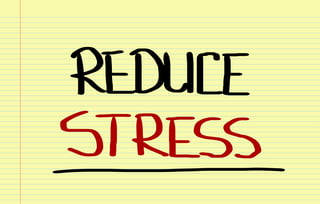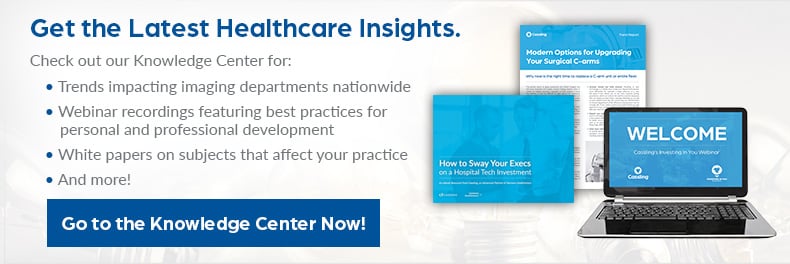 As an imaging professional, you know stress.
As an imaging professional, you know stress.
Healthcare, after all, is a 24/7 industry. Even as workloads rise, you likely face constant pressure to improve your efficiency and service.
That would weigh on anyone. And you probably won’t be surprised to learn that this stress isn’t helping your health. It can depress your immune system, cause prolonged muscle contractions, strain your heart and even lead to an early death – if you handle it wrong.
But Kim Hall, a nursing professor at Nebraska Methodist College, wants you to know that stress, properly managed, doesn’t have to hurt.
In a recent seminar sponsored by Cassling, Kim taught some important tactics that can help take the sting out of stress.
Don’t Compare Your Stress
Kim implores you to change your relationship with stress. To do that, you must understand what stress actually is. She cites Hans Selye, who coined the modern use of the term. Back in 1936, he defined stress as a "nonspecific response of the body to any demand for change."
Kim underscores the word nonspecific. That means no two people have the same reaction to stressful events.
“If I ask several people to sit down and write out your definition of stress, I'm promising that each and every one would have something just a little different,” Kim says. “My stress is mine. It's not yours. It's nobody else’s. And how I respond, how my body responds, it's unique to me.”
It might be tempting to compare your stress levels to your coworkers’. But that’s not fruitful. Stress is a highly individualized, private experience. It’s no sign of weakness to find a situation more stressful than a colleague does.
Make sure that, when you evaluate the stress in your life, you focus on your stress – and no one else's.
Observe What Stress Does to You
Everyone’s familiar with how stress feels. But you may not be aware of all the different ways it affects you. Stress causes a number of subtle but powerful physical changes in your body.
It’s important to understand how stress manifests for you specifically. To accomplish this, Kim recommends mindfulness.
“Mindfulness means being aware of your body, mind and environment,” Kim says. “It’s being present in the very moment. Right here, right now.”
John Cabot-Zinn, PhD, famously teaches mindfulness as a means to manage chronic stress and pain. It’s startlingly effective, even for patients with excruciating conditions, and it can work for you too.
The foundation of mindfulness is body scanning (and no, imaging professionals, this is a very different type of scanning than what you’re probably used to). It’s a simple exercise that you can finish in a few minutes (although longer sessions may be helpful).
To start, you sit comfortably and close your eyes.
Then, beginning with your toes and working your way up, take stock of how every part of your body is feeling. Look for spots of tension or pain. They’re typically sensations you don’t notice in your day-to-day life.
Your observations can teach you a lot about how your body reacts to stress. And the exercise can be a helpful pause in the middle of a harried day.
Kim recommends you make body-scanning a regular part of your routine. When you do so, you can identify the physical responses that go unnoticed when you’re caught in a whirlwind of activity. And that’s the first step toward doing something about.
Change Your Mind About Stress
Most people in the healthcare industry know that stress is associated with a slew of health problems. But Kim cites a TED Talk from psychologist Kelly McGonigal, who invites us to consider some recent studies on the subject. Their conclusions may surprise you.
A large study from the University of Wisconsin tracked 30,000 adults in the United States for eight years. Each year, the researchers asked if each person experienced stress and whether they thought stress was harmful. Then they examined death records to see if any of their subjects died.
They found that people who experienced a lot of stress, somewhat predictably, had a 43% increased risk of dying in that year. But that was only true for the people who believed that stress is harmful for your health.
People who experienced a lot of stress but did not believe stress is harmful were no more likely to die. That's a remarkable affirmation of mind over matter.
Another study from Harvard reinforces the point. This study subjected people to a stress test, but researchers primed some of the subjects with a new approach. They taught participants that stress is helpful. The subjects learned that stress is your body’s preparatory mechanism, that it gives you energy to face the next challenge.
These people reported feeling much less anxious and fearful than the other subjects. Even more remarkable, their physical response to stress changed. Unlike their more anxious peers, their blood vessels didn’t constrict under duress. Their hearts pounded, but in a much healthier way.
The evidence is clear: your attitude about stress can profoundly affect how your body reacts to it.
“You don’t need to have this negative perception about stress,” Kim says. “We need to look at it as an energizing mechanism. It makes us tougher people, stronger people, more resilient.”
So, if you choose to see stress as helpful, you'll deal with it much better.
Feel Stressed? Reach Out
Another promising insight concerns stress’ relationship to the hormone oxytocin. Oxytocin has earned a nickname, “The Cuddle Hormone,” because it causes you to crave connection. High oxytocin levels drive you to seek out companionship and care for others.
But, critically, this hormone is also produced in reaction to stress.
Kim wants healthcare workers to understand this connection. Stress induces a social impulse. That means the best way to alleviate it may be to reach out to others.
“When you’re stressed, I understand wanting to wall yourself away, but that’s counterproductive,” Kim says. “My coworkers love it when I'm stressed, because I go buy them chocolate. I rearrange things in their office. I do not distance myself. I do something good for them, and then, magically, my energy rebounds."
A study from University of Buffalo researchers confirms that Kim has the right idea. The researchers tracked how altruism affects stress’s mortality risk. They found that even the most stressed-out people were no more likely to die – as long as they had significantly served someone else in the past year.
So, surrendering to oxytocin’s influence, and helping other people, is the best way to help yourself. Great news for anyone in a health profession!
Fit Stress Into Your Life
In closing, Kim emphasizes that these techniques help manage stress. They don’t eliminate it. That’s not a realistic goal.
“It’s impossible to have zero stress,” she says. “It doesn’t work in real life.”
Instead, she encourages you to find the right role for stress to play.
“We have to consider this a work in progress. Because we cannot be perfect, ideal people. We can’t get rid of stress’ negative effects completely.”
But, if you can give yourself the time and space to manage your stress, then maybe you can even make it work for you.
Want to help your imaging team reduce stress? Support their continuing education needs by directing them to Cassling's webinars for complimentary CE credits!





Comments